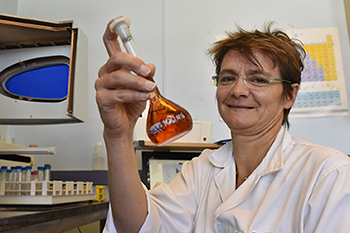Latest News Archive
Please select Category, Year, and then Month to display items
08 December 2020
|
Story Dr Nitha Ramnath
![]()
The Directorate: Community Engagement will be virtually celebrating the launch of the new E-Engaged Scholarship Strategy on 10 December 2020.
Most of the face-to-face community engagement activities could not take place this year due to the outbreak of the COVID-19 global pandemic and related physical distancing restrictions. Therefore, an E-Engaged Scholarship Strategy has been developed as an adapted virtual participatory learning environment in collaboration with our community, business, and government partners. This E-Engaged Scholarship Strategy seeks to make information accessible to communities through dialogue on engaged learning, training, and research for citizens to take actively part in developing their own lives and that of their surrounding communities.
Details of the launch:
Date: 10 December 2020
Time: 16:00 (CAT)
Platform: Microsoft Teams
Join on your computer or mobile app
Click here to join the meeting
For more information, contact Billyboy Ramahlele (Director: Community Engagement) ramahpm@ufs.ac.za
UFS Ground Studies Laboratory receives accreditation to international standard
2016-03-18

Lore-Mari Deysel, Deputy-Director of the institute for Groundwater Studies.
Photo: Charl Devenish |
The Institute for Groundwater Studies (IGS) Laboratory at the University of the Free State is on equal footing with international testing labs. With its accreditation in March 2016 by SANAS (South African National Accreditation System), the IGS Laboratory now officially meets global standards.
Quality of water
The IGS Laboratory mainly analyses the quality of water samples. When it was originally established in 1989, the lab’s central function was to conduct testing for researchers at the institute itself. “After the public and water boards realised their need to analyse water samples, the IGS Laboratory expanded to deliver a service to these clients,” says Lore-Mari Deysel, Deputy-Director of the institute.
Since suppliers and regulatory authorities will not accept test or calibration results from a lab that is not accredited, the IGS initiated the accreditation process.
Accreditation to international standard
In order to be deemed technically competent and able to receive accreditation, labs must meet the ISO/IEC 17025 standard. ISO/IEC 17025 was first issued in 1999 by the ISO (International Organization for Standardization) and the IEC (International Electrotechnical Commission).According to Deysel, this is the single most important standard for calibration and testing laboratories around the world.
“Laboratories that are accredited to this international standard have demonstrated that they are technically competent and able to produce precise and accurate test and/or calibration data. Furthermore, it demonstrates that the university has the capacity to supply valuable and reliable services alongside the academy,” Deysel says.